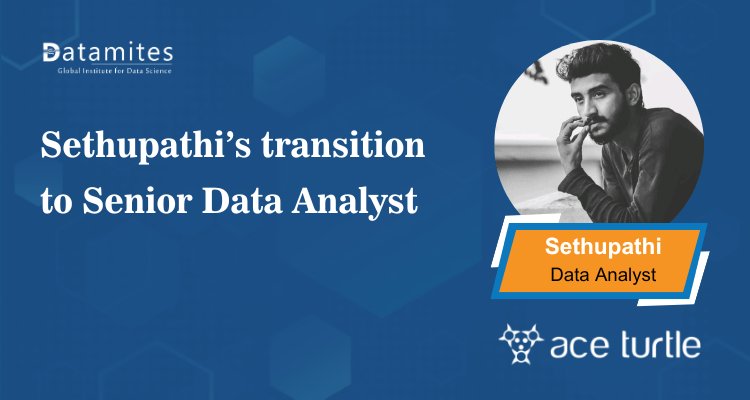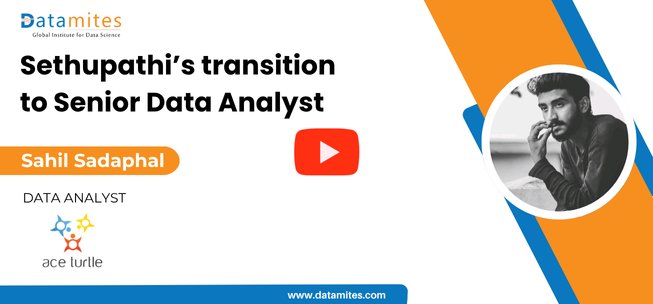Sethupathi’s transition to Senior Data Analyst
Discover Sethupathi’s inspiring journey from backend developer to Senior Data Analyst. Learn how strategic upskilling for data analyst course, Python expertise, and real-world projects helped him transition roles and build a successful data career with a focus on AI and ML.

In today’s data-driven world, transitioning into analytics roles has become a powerful career move for professionals across various domains. With industries rapidly adopting data technologies, individuals with a background in programming or software development are increasingly finding themselves drawn to the field of data science and analytics.
Sethupathi’s Journey from Backend Developer to Senior Data Analyst
Curious about how a career in data unfolds in real life? Sethupathi, a Senior Data Analyst, shares his inspiring journey from a Python enthusiast to a data expert. His story offers valuable insights for anyone looking to enter or grow in the field of data.
Q1: What inspired you to choose the data field after graduation?
Sethupathi: After graduating in 2018, I interned at a startup where I worked as a backend developer using Python, Django, and MongoDB. While working with Python, I discovered its vast applications in data science and AI. That curiosity led me to explore machine learning and eventually join DataMites to formally build my career in data science.
Q2: Can you walk us through your journey with DataMites and your first job placement?
Sethupathi: I joined DataMites during its early days, learning under the mentorship of Mr. Ash. I already had Python experience, but DataMites Institute helped me grasp the fundamentals of machine learning, complete capstone and certification projects, and build a solid portfolio. I was eventually placed through InstaHyre as a Data Engineer at MatchMove.
Q3: How did you prepare for your first interview as a Data Engineer?
Sethupathi: My preparation focused heavily on Python. I used platforms like YouTube, Udemy, HackerRank, and HackerEarth to improve my skills. The interview was Python-centric, covering data pipelines, databases, and some SQL. It was during a time when Python was in high demand in the data industry.
Q4: What challenges did you face during the interview process?
Sethupathi: I struggled a bit with data structures. I recall being asked to implement bubble sort and Dijkstra’s algorithm. Though I wasn’t confident, I managed to handle it. Other than that, I was well-prepared on the Python front.
Q5: Were there theoretical or practical questions in your interviews for data roles?
Sethupathi: Yes. Theoretical questions were minimal. Most questions were scenario-based to test my problem-solving approach. As a data analyst, the focus was mainly on SQL and working knowledge of BI tools.
Read the articles:
- From Mechanical Engineering to Data Analyst: Guruprasad’s Journey
- Shilpa's Data Analyst Journey: From Learning to Success
- Jithin’s Transition: From Engineering to Data Analyst
Q6: Is hands-on experience in one BI tool enough for analysts?
Sethupathi: Absolutely. I’ve worked with 8-9 BI tools, and most of them share similar features. The key is to gain proficiency in at least one tool—be it Power BI, Tableau, or others. Interviewers focus on how you derive insights that can drive business decisions.
Q7: How did your transition from Data Engineer to Data Analyst happen?
Sethupathi: At my first company, once the data engineering platform was built, my role shifted to maintenance. I wanted to explore more aspects of the data field, so I transitioned into analytics—creating dashboards, reporting, and working on data modeling. My aim has always been to understand the entire data journey, eventually leading to AI and ML.
Q8: Was the domain shift from engineering to analytics difficult?
Sethupathi: Not really. I enjoy working with data, and every step helps me get closer to my AI/ML goals. I believe in learning end-to-end, which is why I’ve transitioned from data scientist training to engineering to analytics and now aiming for ML engineer roles.
Q9: What technologies and tools have you used as a Data Engineer?
Sethupathi: Primarily Python frameworks, with occasional use of Talend for ETL. I prefer building data engineering solutions in Python.
Q10: What are the must-have skills for aspiring Data Engineers?
Sethupathi:
- Proficiency in a programming language like Python or Scala.
- Knowledge of Apache Spark (especially PySpark).
- Understanding data pipeline automation and scheduling.
- Familiarity with AWS or GCP.
- Strong grasp of OLAP and OLTP databases (e.g., PostgreSQL, MySQL, Redshift).
- Basic understanding of tools like Kafka for streaming, though not deeply required.
Q11: What should candidates focus on during interviews for analyst roles?
Sethupathi: Interviewers evaluate your approach to solving problems, not just the end result. They look at how well you understand the business context, how you structure your insights, and how effective your data visualization is in driving decisions.
Also refer to the articles:
- How to Become a Data Analyst in Mumbai
- Why DataMites for Data Analytics Course in Mumbai
- The Rise of Data Analytics Careers in Kolkata: What You Need to Know
Highlights from Sethupathi’s Journey:
Here are the key insights and career lessons from Sethupathi’s inspiring alumni talk, highlighting his transition into the data field and practical advice for aspiring professionals.
- Passion-led Shift to Data: A backend development role introduced Sethupathi to Python and sparked interest in data science and AI.
- Upskilling Journey: Formal training at DataMites provided him with essential machine learning skills and practical exposure.
- Python is Crucial: For early roles, especially in engineering and analytics, Python proficiency was a major asset.
- Real-World Projects Help: Capstone and certification projects built during the course gave him real-world experience.
- Transition is Possible: Seamlessly moved across roles—Data Engineer to Analyst—by continuous learning and adaptation.
- BI Tools Mastery: Mastery in just one BI tool is sufficient, provided one understands business impact.
- Interview Preparation: Focused on Python, SQL, and problem-solving scenarios over just theoretical knowledge.
- Tools of the Trade: Spark, Python, Talend, and cloud platforms are essential for data engineers.
- Career Vision: Sethupathi aims to work his way into AI and ML roles by exploring the entire data lifecycle.
- Advice to Aspirants: Build strong problem-solving abilities, be clear about your goals, and learn tools deeply rather than broadly.
Sethupathi’s journey from learning Python to becoming a Senior Data Analyst highlights the power of dedication and the right guidance. His story inspires aspiring data professionals to believe in continuous learning and trust the process to achieve success. The Research Paper report, the global data analytics market, which was valued at USD 41.39 billion in 2022, is expected to surge to USD 346.33 billion by 2030, growing at a CAGR of 30.41%, underscoring its transformative influence across various industries.
Enrolling in an offline Data Analyst course in Pune or top tech cities like Bangalore, Chennai, Coimbatore, Hyderabad, Ahmedabad, Delhi, Jaipur, and Mumbai provides hands-on industry exposure, valuable networking, and strong career opportunities in data analysis and software development.
DataMites Institute is a leading training provider in Data Science, Artificial Intelligence, Machine Learning, Python Development, Data Analytics, Data Engineering, and IoT. Known for its practical, industry-oriented curriculum, DataMites equips learners with the essential skills to thrive in the ever-evolving tech industry.
What distinguishes DataMites is its dedication to quality and global recognition, offering internationally accredited certifications from organizations such as IABAC and NASSCOM FutureSkills. These credentials validate learners’ capabilities and enhance their appeal in a competitive job market.
In addition to offering offline Data Analyst courses in Pune , DataMites provides flexible learning options in cities like Hyderabad, Bangalore, Coimbatore, Ahmedabad, Jaipur, Delhi, and Mumbai—supporting aspiring professionals across India.

